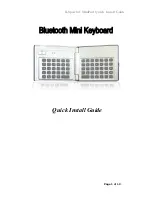
6
Control Assign, Data 1, Data 2, Data 3:
The Control Assign function (Ctrl Asgn) assigns a MIDI continuous control
number (MIDI CC) or other MIDI parameter to the selected knob, button, fader, wheel, or to the sustain pedal. The
Data 1, Data 2, and Data 3 keys define various related aspects of the parameter or function assigned to a control.
Channel Assign:
The Channel Assign function (Chan Asgn) assigns a knob, fader, button, wheel, or the sustain
pedal to a specific MIDI channel.
1.
Press the Edit button.
2.
Press the Select button or Control Select (Ctrl Sel) key.
3.
Select a control as described earlier in this guide.
4.
Press the Channel Assign key. The LED display will show the currently assigned MIDI channel for the active
control (for example, "c.0.2.").
5.
Enter the new MIDI channel number using the number keys.
6.
Press the Enter key.
When assigned to channel "0", the control (knob, fader, button, wheel, or sustain pedal) will transmit on the Global
MIDI Channel. See the next section, "Global Channel" for more information.
NOTE:
When a control is assigned to send SysEx messages, the displayed number represents the SysEx Device ID
instead of the MIDI transmit channel number.
Global Channel:
The Global Channel function (Global Chan) sets the default MIDI channel for the keyboard and all
MIDI controls, except for those that have a specific MIDI channel assigned to them.
1.
Press the Edit button.
2.
Press the Global Channel key. The LED display will show the current Global channel. For example, if channel 1
is the current Global channel, it will appear as "c.0.1".
3.
Enter the new channel number using the number keys.
4.
Press the Enter key.
The Global Channel can also be changed by using the following method:
1.
Press the Select button until the lower edge of the LED displays a red dot above "Global".
2.
Scroll through the MIDI channels using the "<" or ">" buttons to select the new channel number.
Program:
This function sends Program Change MIDI messages on the Global Channel and can be used to select
different sound presets contained within your virtual instrument or sound module.
1.
Press the Edit button.
2.
Press the Program key. The LED display will show the last sent program number (for example, ".0.1.").
3.
Enter the Program number.
4.
Press the Enter key to send the program change message.
Program Change messages can also be sent using the following method:
1.
Press the Select button until the lower edge of the LED shows a red dot above "PGM".
2.
Scroll through the Program numbers using the "<" or ">" buttons.
Bank LSB:
The Bank LSB function sends bank change messages on the Global MIDI channel. These messages are
used to access additional banks of sound presets on virtual instruments or sound modules (if additional banks are
available). Refer to the documentation for the virtual instrument or synthesizer to confirm it will respond to these
messages.
1.
Press the Edit button.
2.
Press the Bank LSB key. The LED display will show the last sent Bank LSB number (for example, ".0.1.").
3.
Enter the new Bank LSB number using the number keys.
4.
Press the Enter key.
NOTE:
Bank LSB messages will not have any effect until they are followed by a Program Change message.
Bank MSB:
The Bank MSB function sends bank change messages on the Global MIDI channel. These messages
are used to access additional banks of sound presets on virtual instruments or sound modules (if additional banks are
available). Refer to the documentation for the virtual instrument or synthesizer to confirm it will respond to these
messages.
1.
Press the Edit button.
2.
Press the Bank MSB key. The LED display will show the last sent Bank MSB number (for example, ".0.1.").
3.
Enter the new Bank MSB number using the number keys.
4.
Press the Enter key.
NOTE:
Bank MSB messages will not have any effect until they are followed by a Program Change message.







































